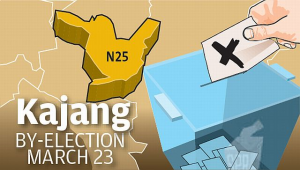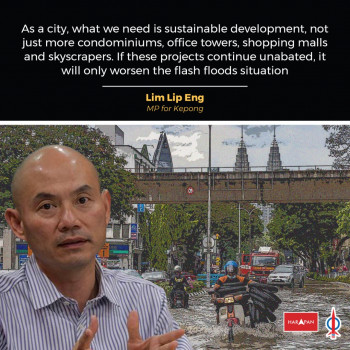By Bob Teoh
 There’s a lot of fluff and sanctimonious platitudes surrounding the Kajang by-election but try to look at it this way. Elections are about seeking mandate or the right to rule. In a two-party democracy. The one that gets the popular vote gets to rule. It’s as simple as that.
There’s a lot of fluff and sanctimonious platitudes surrounding the Kajang by-election but try to look at it this way. Elections are about seeking mandate or the right to rule. In a two-party democracy. The one that gets the popular vote gets to rule. It’s as simple as that.
In a one-power centre like China, the ruler seeks the Mandate of Heaven except that in modern China the mandate comes from the gods within the Communist Party itself and not heaven. The popular mandate counts for nothing. It’s also as simple as that.
The idea is that heaven would bless the authority of a just ruler, but withdraw the mandate from a bad ruler thus leading to the overthrow of that ruler.
The Mandate of Heaven is a device for the removal of incompetent or despotic rulers, and provided an incentive for rulers to rule well and justly in a political system that otherwise offered little checks and balances to this power. It’s the Chinese yin-yang way of harmonising power.
Malaysia is a crude hybrid between the two systems. Ever since independence in 1957 for Malaya and later in 1963 with the formation of Malaysia, the country was run on a one-party system even though we pride ourselves as a Westminster-style parliamentary democracy otherwise also known as a constitutional monarchy.
However, if at all there was any semblance of the emergence of a two-party system, the signs became discernible since 2008 when the ruling coalition lost its two-third majority in parliament for the first time (if we don’t count the 1969 general elections that was followed by the May 13 race riots). At last year’s general elections it lost that majority again. In fact, in an unprecedented manner, it actually lost the popular vote for the first time in half a century.
In Peninsular Malaysia, Barisan Nasional managed to obtain only 45.74 per cent of the popular vote while Pakatan Rakyat got 53.29 per cent! It was only by the votes from the “safe deposit” states of Sabah and Sarawak that Barisan managed to improve its popularity by a miserable 1.64 percentage points but still losing the popular vote to Pakatan. It was only through a highly skewed electoral system that enabled Barisan to end up with enough parliamentary seats to form the government. But the fact remains that it is by no means a government by popular vote. It’s a stolen mandate. It’s as simple as that.
Whatever popularity that the ruling coalition has left it began steadily sliding down since. In fact, barely ten months after the general elections, Kedah Menteri Besar, Mukhriz Mahathir, said Barisan Nasional might lose the next general elections if Putrajaya continued implementing unpopular decisions. He later retracted this assessment.
His father, former Prime Minister Dr Mahathir Mohamad, in an outburst a few months earlier condemned Umno to its deathbed saying that the dominant Malay party in the coalition is ailing and will soon meet its demise.
All is not well with opposition either with trouble brewing in PKR, the component party led by Wan Azizah, wife of Opposition leader Anwar Ibrahim. It’s no secret that Selangor Menteri Besar Khalid Ibrahim and Azmin Ali cannot get along and Anwar has not been able to rein them in.
Some say the problems have reached crisis level to the extent that if it is not resolved, Pakatan may lose Selangor, the crown jewel among the three Pakatan-led states, Penang and Kelantan being the other two.
So the scheme of things it seems is for Anwar to take over as Selangor Mentri Besar as his launch pad to capture Putrajaya, the seat of the Federal government. For this to happen, Anwar needs a state seat although he is already a Member of Parliament up north.
So PKR Selangor assemblyman, Lim Chin Cheh, obliged by vacating his Kajang state seat recently for Anwar to contest in a by-election.
The move immediately attracted criticisms that it is both unethical as well as a betrayal of voters’ trust in the party apart from the burden of addition spending to hold a by-election.
There were similar moves by the ruling coalition previously but no one raised any heckle. What about the so-called pack to allow the Sarawak Chief Minister Taib Mahmud to step down in-term in office and to ascend to governorship of the state? Well, Taib has to resign his state seat for this intra-party moves. Can the critics now spot the hypocrisy of it all? If the complaint was that Anwar was doing it for his personal ambition to be PM, isn’t then Taib doing the same for wanting to be Governor and along the way appointing his former brother-in-law to be the new Chief Minister of the largest state in Malaysia?
The country has been running-on-the-spot since the last general elections with neither the ruling nor opposition coalitions able to make much headway. The Kajang by-election seen in this light, then, is a national referendum for a fresh mandate. Like it or not, it’s Anwar and Najib who are now attempting to seek the Mandate of Heaven for themselves. But it’s the little gods in their respective parties who will decide their fates. Meanwhile, the voters of Kajang can expect to be well feted whatever the outcome. It’s all so simple as that.
* The views expressed in this article are the personal opinion of the columnist and this article first appeared in mysinchew.com



